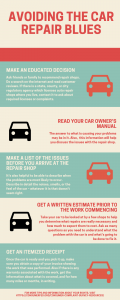We’ve all been there before. You get in your car and turn the ignition, but it will not start. Not today! Any day but today. With a little luck the car finally starts. But now where should you take the car for a mechanic to do a diagnostic? With a little planning you can be prepared the next time this happens to you.
Make an educated decision. Ask friends or family to recommend repair shops. Ask about any poor experiences as well. Do a search on the internet and read customer reviews. If there is a state, county, or city regulatory agency which licenses auto repair shops where you live, contact it to ask about required licenses or complaints.
Read your car owner’s manual. The answer to what is causing your problems may be in it. This information will help you discuss the issues with the repair shop.
Make a list of the issues with the car before you arrive at the repair shop. It’s also helpful to be able to describe when the problems are most likely to occur. Does the car start after several attempts? Only refuse to start in the morning? On cold days? Is the car pulling to one side? Is there fluid on the ground after you park, and what color is it? Describe in detail the noises, smells, or the feel of the car – whatever it is that doesn’t seem right.
Get a written estimate prior to the work commencing. If you can, take your car to be looked at by a few shops to help you determine what repairs are really necessary and how much to expect them to cost. Ask as many questions as you need to understand what the problem with the car is and what’s going to be done to fix it. If you would like the old parts, let the mechanic know before the work begins. Tell the shop to call you if the mechanic discovers more problems that are going to cost more than the estimate to fix. Before leaving the car for the repairs, remove any valuables or items you may need (work ID, toll transponder, etc.).
Get an itemized receipt. Once the car is ready and you pick it up, make sure you obtain a copy of your invoice showing the work that was performed. Also if there is any warranty associated with the work, get the information about what is covered, and for how many miles or months, in writing.


